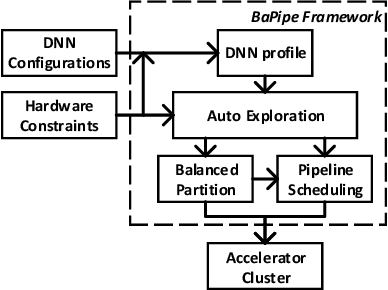Letian Zhao
Exploring the Performance Improvement of Tensor Processing Engines through Transformation in the Bit-weight Dimension of MACs
Mar 08, 2025Abstract:General matrix-matrix multiplication (GEMM) is a cornerstone of AI computations, making tensor processing engines (TPEs) increasingly critical in GPUs and domain-specific architectures. Existing architectures primarily optimize dataflow or operand reuse strategies. However, considering the interaction between matrix multiplication and multiply-accumulators (MACs) offers greater optimization potential. This work introduces a novel hardware perspective on matrix multiplication, focusing on the bit-weight dimension of MACs. We propose a finer-grained TPE notation using matrix triple loops as an example, introducing new methods for designing and optimizing PE microarchitectures. Based on this notation and its transformations, we propose four optimization techniques that improve timing, area, and power consumption. Implementing our design in RTL using the SMIC-28nm process, we evaluate its effectiveness across four classic TPE architectures: systolic array, 3D-Cube, multiplier-adder tree, and 2D-Matrix. Our techniques achieve area efficiency improvements of 1.27x, 1.28x, 1.56x, and 1.44x, and energy efficiency gains of 1.04x, 1.56x, 1.49x, and 1.20x, respectively. Applied to a bit-slice architecture, our approach achieves a 12.10x improvement in energy efficiency and 2.85x in area efficiency compared to Laconic. Our Verilog HDL code, along with timing, area, and power reports, is available at https://github.com/wqzustc/High-Performance-Tensor-Processing-Engines
Efficient Message Passing Architecture for GCN Training on HBM-based FPGAs with Orthogonal Topology On-Chip Networks
Nov 06, 2024



Abstract:Graph Convolutional Networks (GCNs) are state-of-the-art deep learning models for representation learning on graphs. However, the efficient training of GCNs is hampered by constraints in memory capacity and bandwidth, compounded by the irregular data flow that results in communication bottlenecks. To address these challenges, we propose a message-passing architecture that leverages NUMA-based memory access properties and employs a parallel multicast routing algorithm based on a 4-D hypercube network within the accelerator for efficient message passing in graphs. Additionally, we have re-engineered the backpropagation algorithm specific to GCNs within our proposed accelerator. This redesign strategically mitigates the memory demands prevalent during the training phase and diminishes the computational overhead associated with the transposition of extensive matrices. Compared to the state-of-the-art HP-GNN architecture we achieved a performance improvement of $1.03\times \sim 1.81\times$.
BaPipe: Exploration of Balanced Pipeline Parallelism for DNN Training
Jan 14, 2021



Abstract:The size of deep neural networks (DNNs) grows rapidly as the complexity of the machine learning algorithm increases. To satisfy the requirement of computation and memory of DNN training, distributed deep learning based on model parallelism has been widely recognized. We propose a new pipeline parallelism training framework, BaPipe, which can automatically explore pipeline parallelism training methods and balanced partition strategies for DNN distributed training. In BaPipe, each accelerator calculates the forward propagation and backward propagation of different parts of networks to implement the intra-batch pipeline parallelism strategy. BaPipe uses a new load balancing automatic exploration strategy that considers the parameters of DNN models and the computation, memory, and communication resources of accelerator clusters. We have trained different DNNs such as VGG-16, ResNet-50, and GNMT on GPU clusters and simulated the performance of different FPGA clusters. Compared with state-of-the-art data parallelism and pipeline parallelism frameworks, BaPipe provides up to 3.2x speedup and 4x memory reduction in various platforms.
 Add to Chrome
Add to Chrome Add to Firefox
Add to Firefox Add to Edge
Add to Edge